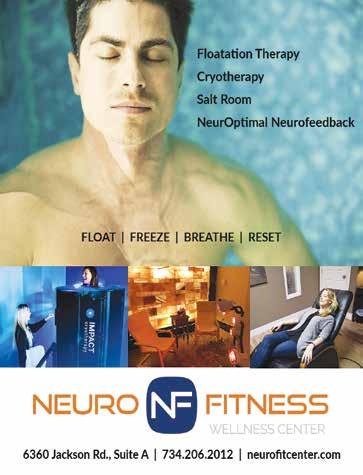
16 minute read
CALM DOWN
Calm Down Taming the Flames of Stress-Related Illness
by Marlaina Donato
We are beings of neurochemical and hormonal intri- cacy, and within this mixed bag of biology lies our magic. Our human experience is visceral; we cry from sadness and joy, flush from embarrassment, laugh with amusement and exhibit quirky mannerisms when we lie. Whether we see it as a blessing or a curse, we’re hardwired to embody the sacred fire of our emotions.
It also means that stress and our bodies are in perpetual partnership. “Systematically, the mind and body work together. Grabbing your belly when you hear bad news and saying, ‘I feel sick,’ or having ‘butterflies in your stomach’ are a testament to how everyday stress affects us physically,” says Stephanie Mansour, Chicago fitness expert and host of the national PBS show Step It Up With Steph.
“Stress serves a useful purpose by increasing alertness—the sometimes lifesaving ‘fight-or-flight’ response—but chronic stress leads to elevated stress hormones like cortisol and catecholamines,” says emergency room physician Thomas Krisanda, at Northwest Hospital, in Randallstown, Maryland. “Cortisol can elevate blood glucose and suppress the immune system. Elevated catecholamines raise blood pressure and stress the heart. Over time, this can lead to hypertension, heart disease, kidney disease, diabetes or strokes.”
According to The American Institute of Stress, 77 percent of people experience the physical backlash of emotional stress in the form of headaches, chronic migraines, fatigue, digestive woes, muscle tension, dizziness and changes in libido. Research published this year in the Journal of the American Heart Associa- tion shows that children that experience severe adversity or live with alcoholics or drug addicts are at a 50 percent higher risk for developing cardiovascular disease later in life. Experts agree that this statistic goes beyond poor lifestyle choices, and might point to a biological inability to cope with everyday pressures.
Working with—rather than against—the body’s nervous sys- tem by employing lifestyle changes, releasing trauma and consid- ering options like a nourishing diet, safe herbal options and gentle energy modalities can help to break a vicious cycle.
Gut Instincts
Studies involving both mice and humans show that beneficial gut microorganisms are altered by emotional stress. The same bacte- ria responsible for bolstering the body’s fortress of immunity also generate neurotransmitters like serotonin, dopamine and norepi-
nephrine. These neurochemicals in the gut’s enteric nervous system control major biological functions that include heart rate, sleep cycles, muscle movement and mood.
While commonly prescribed antibiotics eradicate infectious invaders, they also kill off beneficial bacteria and neurotransmitters, opening the door to depressive disorders. Because approximately 95 percent of the body’s serotonin is produced in the gut, it’s not surprising that overuse of antibiotics has been associated with mental health conditions. British research published in the Journal of Clinical Psychiatry in 2015 documents case-control studies over an 18-year period involving 202,974 patients with depression. The findings show a high risk for anxiety and depression following repeated antibiotic use.
Connecting the dots further, 2018 research published in the Journal of Neuroendocrinology correlates compromised intestinal permeability with a weakened blood-brain barrier and alcohol addiction. Research published in 2014 in the journal PLOS One involving patients with irritable bowel syndrome (IBS) reveals abnormalities in catecholamines, elevated plasma cortisol and hyperactivity of the amygdala—the part of the brain that can become stuck on overdrive from trauma and other life stresses.
In a nutshell, negative emotional states can suppress immunity and foster more frequent antibiotic prescriptions and in turn, promote neurological loops of chronic depression and anxiety, and even more compromised immune response.
Functional gastrointestinal disorders like IBS and inflammation-driven Crohn’s disease are often exacerbated by emotional upset and improved with stress management techniques like biofeedback, cognitive behavioral therapy, psychoanalysis, hypnotherapy, meditation and breath work.
One Body, Many Selves
Resolving emotional trauma can offer unexpected hope for conditions that elude improvement or scientific understanding. A deeper look into how unrecognized or unreleased emotional pain can contribute to disease might help to solve the riddle of digestive problems, eczema, inflammatory bowel conditions and pain syndromes, including the multi-system agonies of fibromyalgia and chronic fatigue syndrome. It’s a widespread misunderstanding that psychosomatic (mind-body) health conditions are imaginary or the product of mental instability. In actuality, the term psychosomatic simply refers to physical diseases with no organic origin that are presumed to have unconscious emotional taproots.
“We are made up of different types of energy,” explains LaStacia Ross, a reiki master and sound healer at Eclectic Soul Studio, in Pittsburg, Kansas. “Physical or sensory energy is the energy of the physical body. Our outer energy field is subtle energy which consists of layers and includes thoughts and emotions. I like to think of the subtle energy field as a library containing the records of everything we’ve ever experienced.”
Reiki, a form of non-touch therapy, is now deemed valuable by many respected hospitals, like the Memorial Sloan Kettering Cancer Center, in Manhattan. Springboarding from the philosophy that we are trinities of body, mind and spirit, reiki and other forms of energy medicine aim to
encourage the flow of vital life force. Ross, who also uses sound resonance via tuning forks in her work, has witnessed significant improvement in her clients. “Energy work can help release stored energetic patterns of trauma and stress that no longer serve us,” she says. “Relaxation is an immediate benefit of energy work. People often feel a huge mental weight lifted and report pain relief, sometimes after just one session.” Despite the many gains of energy work, Ross emphasizes individual timing. “On a subconscious level, pain or illness can serve us in some way without us realizing it. Sometimes we’re not ready to work through our issues or let them go, even if we think we are.”
Investing in Equilibrium
Stress-induced psychosomatic illness does not discriminate, and even affects members of the medical field. A 2009 study published in the Indian Journal of Occupational and Environmental Medicine found that professional burnout in nurses can manifest as back and neck pain, acidity, anger and impaired memory.
Krisanda underscores the importance of
self-care in all walks of life. “If you don’t take care of yourself, you are useless to care for others. Adopt a healthy diet and exercise and make it a routine. We live in a very materialistic society, and I believe this also leads to stress, unhappiness and a sense of being entitled and never being satisfied. Just let go.”
He also stresses the importance of support. “An emergency room is an incredibly hectic, frightening and sometimes violent place. I rely on my colleagues, and we support each other. For me, the most important thing is to realize that I’m not in it alone.” Krisanda also finds balance by taking a few minutes in a quiet place to collect his thoughts and enjoy a peaceful moment.
Basic, whole foods can help to maintain homeostasis. “Make sure that food is fueling you,” says Mansour. “Cooked vegetables and broths are very soothing. Instead of a juice cleanse or an extreme diet, focus on nourishing, calming foods like soups, lean proteins to stabilize blood sugar levels and healthy fats to support brain function. Reducing alcohol can help improve liver function.”
Sarah Kate Benjamin, a holistic chef and herbalist in Sebastopol, California, finds her own healing rhythms by eating with the seasons and using medicinal plants in inspired, everyday dishes. Co-author of The Kosmic Kitchen Cookbook: Everyday Herbalism and Recipes for Radical Wellness, she sees herbs as life-giving examples of resilience. “Herbs have been here long Plant Power for Combatting Stress
Sarah Kate Benjamin’s Personal Favorites:
Passionflower (Passiflora incarnata) soothes restless minds from anxiety and insomnia, and eases menstrual cramps or muscle spasms. Skullcap (Scutellaria lateriflora) helps to strengthen the brain and revitalize the central nervous system, and helps to calm the mind and relieve nervous stress and headaches. It is even more beneficial when combined with lavender or chamomile. Chamomile (Matricaria chamomilla) helps to soothe emotional and muscle tension; relieve stress-related gut symptoms like gas, cramping, irritable bowel syndrome and ulcers; calm heat-related emotional and physical issues such as eczema, anger and frustration; and generally promote a sense of calm. Wonderful in baths, teas and as an herbal garnish.
In addition to Benjamin’s recommendations, other stress-fighting herbs to consider are Ginkgo, panax and Siberian ginseng, fo-ti, rhodiola, reishi mushroom, goji berries, licorice root, lavender, rose, lemon balm, tulsi (holy basil), ashwagandha and mimosa bark.

before us and have experienced their own form of stressors. Working with nervous system-supportive herbs in my food, beverages or even as tinctures really help me find balance when I’m overwhelmed.”
Some of her allies are oat tops, lemon balm, skullcap, chamomile and passionflower. For Benjamin, everyday choices play a huge role in healing. “Making small lifestyle shifts in your work or home life can really help you move into a more relaxed state. I like to think of it as a sort of mantra: ‘Help the herbs help you,’” she says. In a world that is fixated on external validation, little things matter. “If I give myself permission to do the things that really nourish me, I’ll be the best version of myself. Perhaps most importantly, I will like me, and that matters tremendously.”
Marlaina Donato is an author and recording artist. Connect at AutumnEmbersMusic.com.
Spa experiences to bring forth the stillness within and radiance throughout.


Ann Arbor’s New Luxury Holistic Spa.
415 N. Main Street Ann Arbor, MI 48104 kwestskinbodysoul.com contact@kwestskinbodysoul.com Instagram k.westskinbodysoul 734-436-8991

Safely Returning for Routine Dental Care Now
by Steve Gray, DDS F or most of us, the COVID-19 pandemic has created more change to every aspect of our daily lives than any other event. While things are far from back to normal, every little step back to normalcy has been refreshing. After months of being shuttered, dental offices in Michigan have mostly returned to regular operations with the addition of increased personal protective equipment (PPE) and coronavirus compliance protocols.
So far, receiving dental care has not been linked to the spread of COVID-19 among dental staff or communities. The increase in PPE, detailed screening protocols, use of air purification systems and uncompromising sterilization procedures has been very effective. At Ann Arbor Smiles, we have had roughly 5,500 total visits and 2,600 cleanings since reopening in June with zero known transmissions of COVID-19 to patients or staff. Those with concerns about the safety of visiting a dental office can call a local dentist or the Michigan Dental Association to learn about the measures that have been put into place to assure their safety and get the confidence to return to routine care.
Delaying dental care can lead to much more costly and invasive treatment such as periodontal therapy (gum disease), root canals or dental implants. Seeing a dentist at least every six months for a checkup and cleaning is still the best preventive recommendation. The link between poor oral health and other systemic illnesses like heart disease and diabetes is widely accepted by both medical and dental professionals.
Many dentists encountered an overflow of work in the months that followed reopening—some of which could have been prevented by earlier intervention. As recently reported in the New York Times, many dentists report seeing a steep increase in the number of cracked or fractured teeth. Most of these teeth can be saved with crowns or conservative onlay restorations, but the longer these fractures are allowed to damage the tooth without treatment, the less likely that is. For some patients, there are concerns about the costs associated with dental care, but there are many options available for patients with and without insurance coverage.
Those with dental insurance may have unused benefits remaining due to the extended closing of dental offices. The last few months of the year can be a great time to use those benefits if they expire on December 31. For those without dental insurance, some dental offices provide an in-house dental savings plan that can save individuals and families hundreds or thousands of dollars per year. Many employers also offer a health savings or flexible spending account that can be used for dental health care. Also, there are special financing programs like CareCredit or LendingTree which provide zero-percent financing for 12 months at participating offices.
For those that may be suffering from a cracked or broken tooth, or are simply overdue for a preventive visit, the best thing to do is to call a local dentist and begin receiving care again. Dental professionals have worked very hard alongside the Centers for Disease Control and Prevention and the Occupational Safety and Health Administration office to ensure patients can return safely to their local dental office.
Dr. Steve Gray, DDS, is a general dentist at Ann Arbor Smiles, with two locations in Ann Arbor. He has a focus on cosmetic dentistry, sedation dentistry, full-mouth restorative care and computerized CAD/CAM restorations. For appointments and more info, visit Ann ArborSmiles.com. See ads pages 3, 22, 37 and 38.

Stressed-Out Teens
Ways to Help Them Chill
by Ronica O’Hara
cottonbro/Pexels.com B eing a teenager is never easy, but it’s even harder these days, with the upheaval of the pandemic intensifying the normal academic, social and hormonal turmoil of these pivotal years. It’s no wonder teens are reporting record levels of stress, anxiety and depression: In a Pew Research survey, 70 percent of teens said mental health was a major problem among their peers—and that was in February, before the pandemic hit. A recent online poll found that most teens are worried that the pandemic will affect their family’s physical or financial health and that many feel lonelier than usual and worry about losing ground in academics and activities.
Extending a helping hand to teens is not always well received. They can be notoriously resistant to advice, even when they’re stressed, partly because of their brain chemistry, explains Gail Saltz, M.D., clinical associate professor of psychiatry at the New York Presbyterian/Weill Cornell School of Medicine and host of the Personology podcast. A teen’s highly active amygdala makes risk-taking a thrill even as the frontal lobe that weighs consequences is not fully developed, while at the same time, a teen seeks independence—an identity and freedom to be more like an adult. “This combination means their capacity and interest in taking parental direction is not there,” she says. “As a result, parents in reaction often get louder and more insistent in telling them what to do, which fails and drives them further away.”
The best way to communicate with a stressed teen, say many child psychologists,
$5.00 OFF Health Products!


Expires 10/31/20, one per customer, not valid on supplements except cod liver and butter oil.
Tired? Overweight? Stressed? Or just confused about your health?
“Before I experienced a number of different symptoms ranging from trouble sleeping and night sweats to random pains and lumps. My diet was poor, lots of baked goods and coffee. I had issues with one of my knees from a car accident. I felt tired and stressed almost all the time.



Since coming to Dr. Shannon I sleep through the night without issue, my
Dr. Shannon is a knee pain has been reduced to almost the point of non-existence. I am Nutrition Response no longer tired and stressed. Dr. Shannon has been able to help
Testing™ Master relieve the random pains I had. Mostly my diet has improved Instructor and uses Activator Methods Chiropractic. greatly and I understand how important it is for my health! – K.D. “ Check out our website to see our selection of healthy Thrive carries 100% Pure cosmetics, Ancient Minerals magnesium, Ice Chips candy, One World products! Whey protein, Young Living oils, and more! 6901 State Rd, Ste D, Saline • 734-470-6766 Thrive-Wellness-Center.com
is to listen deeply while letting them do most of the talking, and offering sympathetic support while withholding judgment. Instead of giving advice, “Validate your teen’s experience and attempt to step into their shoes. Let your teen know that you hear them, that you support them in their decisions and ask your teen what you can do to help them,” advises clinical psychologist Alyssa Austern, PsyD, of Chatham, New Jersey. Other steps can help a teen weather this time of high stress:
1Back up the basics. Make sure there’s healthy food and snacks in the fridge. Encourage teens to exercise daily, especially outdoors, and support them in getting eight to 10 hours of sleep.
2Make self-compassion a family habit. The self-compassion approach to self-care, which is rapidly gaining ground among psychologists, has three elements: treating ourselves as kindly as we would a dear friend, realizing that many other people have the same problems so we’re not alone, and mindfully and nonjudgmentally observing our emotional state.
This method has proven to be helpful not just for adults, but for teens, as well. A University of Edinburgh meta-analysis that synthesized 17 studies of more than 7,000 teens in six countries concluded that those with high levels of self-compassion had lower levels of stress caused by anxiety and depression. University of North Carolina researchers found that teens exhibited lower stress, anxiety and depression, as well as more resilience and gratitude, after six self-compassion sessions.
A good place for parents to start is with themselves: If they are anxious, overprotective or fearful, a teen is likely to follow suit, reports a study in the Journal of Abnormal Child Psychology. Helpful books, websites and programs for both teens and adults can be found at Self-Compassion.org, operated by Dr. Kristin Neff, an associate professor of educational psychology at the University of Texas at Austin who was a pioneer in the concept.
3Engage them with creative activities. As teens can seek independence, making sure they spend quality time with the family is also important for their well-being, research shows. “Find ways to connect, converse and unwind together as a family,” advises Crissy Fishbane, of Raleigh-Durham, North Carolina, co-founder of HER Health Collective, an online community for mothers. “Teens need to see their parents engaging in self-care behaviors themselves, and it’s even better if you can engage in self-care as a family.” She suggests taking a virtual or outdoor yoga class together, playing a board game, having sudoku competitions, learning deep-breathing techniques or starting a family book club.
4Encourage reaching out to help others. A study in theJournal of Adolescence suggests that altruistic behaviors, including large and small acts of kindness, may increase teens’ feelings of self-worth, especially if it involves helping strangers. In Poland, the more teens helped out others in a flood, the more supportive and proactive they became, another study found. Depending on their interests, teens may be drawn to local environmental, social justice, religious or political activities. DoSomething.org offers useful ideas and links, and environmental projects for teens can be found at EarthForce.com, SierraClub.com and GlobalClimateStrike.com.
Ronica O’Hara is a Denver-based health writer. Connect at OHaraRonica@gmail.com.
STOP SMOKING NOW!

“A lot of people are wary about hypnosis, they think it’s kooky or witchcrafty, but really it is a very comfortable relaxation...and it onlyhelps you do what youwant to do.” says onesatisfied client.
With a 95% Success rate, Ariana Joy Arlen guarantees smoke cessation in just ONE visit – and unlike edications, there are no unwanted side-effects!








